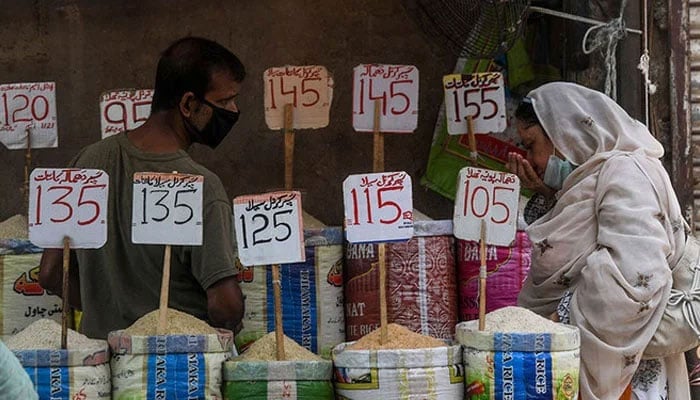Inflation hits nearly six-decade low at 0.69%
By contrast, price gains picked up in alcoholic beverages and tobacco, which rose 7.5% from 6.7% month earlier
ISLAMABAD: Pakistan’s annual inflation rate eased for a fifth straight month in March, dropping to 0.69 percent from 1.5 percent in February, marking the lowest level since 1968, official data showed Thursday.
The decline also marked the eighth consecutive month of single-digit inflation. The Consumer Price Index (CPI) drop in March was a sharp fall from 20.7 percent recorded in the same month last year, according to the Pakistan Bureau of Statistics. In May 2023, inflation had hit a historic high of 38 percent.
Economists believe that the government’s recent power tariff reduction of Rs7.41 per unit could further ease inflation in the coming months. Some analysts suggest inflation may even turn negative, bringing tangible relief to household budgets.
Food and beverage deflation worsened in March, with prices tumbling -5.1pc from a -4.2 percent drop in February, led by a 30.2 percent plunge in perishable food costs. Other key sectors also saw continued declines — transportation fell -1.2 percent, deeper than February’s -1.1 percent drop, while housing and utilities slid -2.2 percent after a -0.6 percent decrease in February.
Price pressures eased in several categories. Inflation for clothing and footwear slowed to 13.5 percent from 13.8 percent, household equipment maintenance softened to 3.7 percent from 4.5 percent, health services moderated to 13.8 percent from 14.3 percent, and recreation and culture cooled to 7.7 percent from 8.4 percent.
By contrast, price gains picked up in alcoholic beverages and tobacco, which rose 7.5 percent from 6.7 percent a month earlier. Education costs climbed 11.9 percent from 10.9 percent, while inflation in miscellaneous goods and services rose quickened to 13.4 percent from 12.8 percent in February 2024.
The government further reported that for the first nine months (July-March) of FY2024-25, average inflation stood at 5.25 percent, down from 27.06 percent in the same period last year.
Urban inflation in March was at 1.16 percent year-on-year, while rural inflation dropped to 0.02 percent, compared to 21.9 percent and 18.97 percent, respectively, in March 2024.
Core inflation, which excludes food and energy prices, stood at 8.2 percent year-on-year in March, up from 7.8 percent in February but lower than 12.8 percent in March 2024. On a month-on-month basis, it increased by 0.5 percent.
The Wholesale Price Index (WPI) recorded 1.6pc in March 2025, compared to a 0.7pc decline in February and a 14.8pc increase in March 2024.
Despite easing price pressures, Pakistan’s real interest rate — now at 11.31 percentage points with the central bank’s policy rate at 12pc — remains one of the highest globally.
Meanwhile, Prime Minister Shehbaz Sharif expressed satisfaction over the significant drop in inflation, calling it a testament to his government’s effective economic policies and dedication to public welfare. In a statement, the prime minister underscored that this Ramazan inflation was at its lowest in decades easing the financial burden on citizens.
He credited the decline in price hike to the government’s strategic economic planning and tireless efforts to stabilise the prices.
-
 Rihanna 38th Birthday Detail Breaks The Internet, Featuring Unexpected Huge Item
Rihanna 38th Birthday Detail Breaks The Internet, Featuring Unexpected Huge Item -
 Liza Minnelli Recalls Rare Backstage Memory With Mum Judy Garland In New Memoir
Liza Minnelli Recalls Rare Backstage Memory With Mum Judy Garland In New Memoir -
 Armed Intruder Shot Dead At Trump's Mar-a-Lago Residence: US Secret Service
Armed Intruder Shot Dead At Trump's Mar-a-Lago Residence: US Secret Service -
 Total Lunar Eclipse: What You Need To Know And Where To Watch
Total Lunar Eclipse: What You Need To Know And Where To Watch -
 Timothee Chalamet Admits To Being Inspired By Matthew McConaughey's Performance In 'Interstellar'
Timothee Chalamet Admits To Being Inspired By Matthew McConaughey's Performance In 'Interstellar' -
 'Determined' Savannah Guthrie Plans To Honour Her Mother Nancy With Major Move: 'It's Going To Be Emotional'
'Determined' Savannah Guthrie Plans To Honour Her Mother Nancy With Major Move: 'It's Going To Be Emotional' -
 Train's Pat Monahan Blows The Lid On 'emotional' Tale Attached To Hit Song 'Drops Of Jupiter'
Train's Pat Monahan Blows The Lid On 'emotional' Tale Attached To Hit Song 'Drops Of Jupiter' -
 Kurt Russell Spills The Beans On His Plans For Milestone Birthday This Year: 'Looking Forward To It'
Kurt Russell Spills The Beans On His Plans For Milestone Birthday This Year: 'Looking Forward To It' -
 PayPal Data Breach Exposed Sensitive User Data For Six-month Period; What You Need To Know
PayPal Data Breach Exposed Sensitive User Data For Six-month Period; What You Need To Know -
 Prince William Receives First Heartbreaking News After Andrew Arrest
Prince William Receives First Heartbreaking News After Andrew Arrest -
 11-year-old Allegedly Kills Father Over Confiscated Nintendo Switch
11-year-old Allegedly Kills Father Over Confiscated Nintendo Switch -
 Jacob Elordi Talks About Filming Steamy Scenes With Margot Robbie In 'Wuthering Heights'
Jacob Elordi Talks About Filming Steamy Scenes With Margot Robbie In 'Wuthering Heights' -
 Why Prince Harry Really Wants To Reconcile With King Charles, Prince William, Kate Middleton?
Why Prince Harry Really Wants To Reconcile With King Charles, Prince William, Kate Middleton? -
 'Grief Is Cruel': Kelly Osbourne Offers Glimpse Into Hidden Pain Over Rockstar Father Ozzy Death
'Grief Is Cruel': Kelly Osbourne Offers Glimpse Into Hidden Pain Over Rockstar Father Ozzy Death -
 Timothée Chalamet Reveals Rare Impact Of Not Attending Acting School On Career
Timothée Chalamet Reveals Rare Impact Of Not Attending Acting School On Career -
 Liza Minnelli Gets Candid About Her Struggles With Substance Abuse Post Death Of Mum Judy Garland
Liza Minnelli Gets Candid About Her Struggles With Substance Abuse Post Death Of Mum Judy Garland




